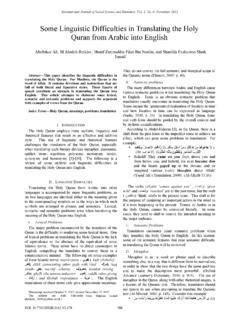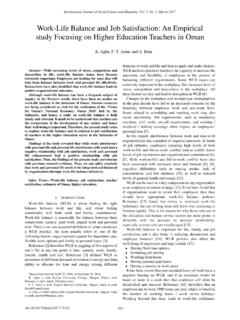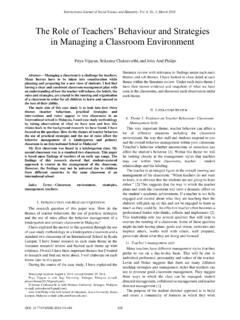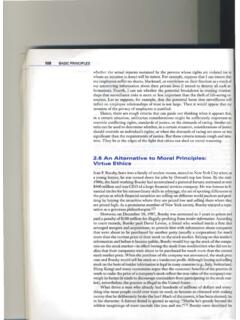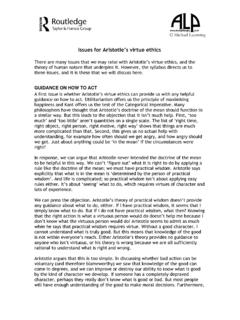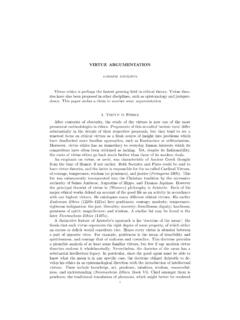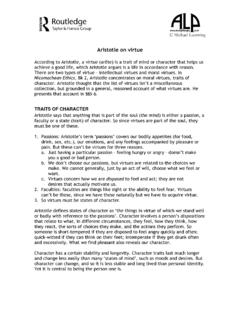Transcription of Virtue Theory, Relativism and Survival - IJSSH
1 International Journal of Social Science and Humanity, Vol. 3, No. 4, July 2013416 Abstract Virtue theory claims that moral virtues define the moral person. Moral Relativism claims there are no necessary universal moral values-this theory is not rationally sustainable as a theory of ethics . The necessary functions of social order and existence require certain moral virtues . There are six main universal moral virtues : wisdom, courage, justice, humanity, temperance, and transcendence. Societies cannot function efficiently without these core virtues . Index terms Moral Relativism , social structure, Virtue theory . I. INTRODUCTION The realm of ethics seems to be one of the most conflicted and uncertain in philosophy and in human history.
2 This conflict would be tolerable if it did not have practical and serious consequences and ramifications in the arena of human action, society, and moral skepticism in general. To develop an approach towards addressing this critical problem an appropriate methodology must be used. Since the issue involves the interface of ethical values and social structures, an interdisciplinary, historical, comparative, conceptual and logical methodology must be implemented. The findings of sociology, anthropology, psychology and other sciences must be assessed. Further, the contributions of philosophy including various ethical paradigms and tools for logical analysis must be incorporated.
3 II. Relativism One aspect of the problem of ethical disagreements and skepticism about the rational resolution of moral disputes is the rise of the theory of Relativism of which there are several forms. Descriptive or cultural Relativism is the factual claim that there are disagreements about morality in different cultures and different times even within one culture. Ethical or moral Relativism is the normative view that there is and cannot be no one correct rational morality or set of value for all societies [1]-[3]. Relativism , in its extreme forms, holds that morality is a social construct such that in principle any moral system is possible in any society.
4 [4] It claims nothing can be judged intrinsically, necessarily and universally to be good or evil. Some defenders of Relativism see moral systems as ideological in nature whose primary function is to perpetuate the ruling class [5]. Ethical Relativism is often a consequence of epistemological Relativism and postmodern skepticism which claim that Manuscript received April 3, 2013; revised June 3, 2013. Joseph Grcic is with Indiana State University. he is a professor of philosophy, His lastest published book is Free and Equal (e-mail: there can be no objective or universal knowledge in any human endeavor including ethics .)
5 Metaethical Relativism is the claim that moral concepts have meaning only within a given cultural framework. Any two different normative systems are incommensurable and one cannot be rationally judged to be superior to the other. Relativism in the extreme form conflicts with the fact that there are similarities in moral virtues found across all stable cultures. These virtues and values are a function of the universality of human nature, human needs and the common problems societies must solve to survive. The differences that do exist in moral norms are limited and arise due to different social and historical contexts, ideologies and belief systems which shape moral norms to some degree.
6 But these differences are secondary when compared to the larger common foundation of core values based on the common problems which must be solved for communities to survive. III. Virtue theory Studies of various religious and philosophical traditions show the existence of some universal moral virtues . Perspectives as diverse as Hinduism, Confucianism, Buddhism, Taoism, Judaism, Christianity, Islam, Platonism, Aristotelianism, and others defend six core virtues as necessary for social order and human flourishing. [6] But before examining this claim, a brief explanation of understanding ethics from the perspective of virtues in contrast to other main approaches is needed.
7 Deontology such as that of Kant is a rationalistic view of ethics which rejects any role for emotions and is based on the view of ethics on the nature of the intentions formed and the duties accepted. Teleological ethics such as the utilitarianism of John S. Mill, understands ethics as based on the consequences in terms of happiness caused by actions [7]-[9]. virtues are character traits or habits of action which, according to Virtue theory , define the moral person. Virtue theory accepts the importance of intentions and consequences but rejects as rationalistic and unrealistic view of ethics in the other approaches and sees ethical actions as combining reason and emotions.
8 A Virtue approach sees being ethical as not just deducing specific acts from abstract principles but having a type of character with sound judgment to respond correctly to varied complex circumstances. Virtue ethics grounds moral values in the personality structure and as such provides the necessary motivational element which deontological and teleological paradigms lack. Finally, Virtue ethics is open to using the findings of disciplines such as psychology, sociology, anthropology and other disciplines to clarify morality and understand the lived context of human action and how Joseph Grcic Virtue theory , Relativism and Survival DOI: International Journal of Social Science and Humanity, Vol.
9 3, No. 4, July 2013417 moral behavior is generated. IV. UNIVERSAL virtues Six foundational virtues have been discovered to play central roles in cross-cultural traditions and societies [10]. These virtues are not defined in exactly the same manner in all cultures but there is a common core meaning. The virtues are: courage, justice, humanity, temperance, transcendence and wisdom. Courage is defined as the rational response to fear and has three main aspects, physical, moral and psychological. Physical courage is form of courage wherein one overcomes the fear of physical injury or death to save others or oneself.
10 Moral courage means to hold to one s moral beliefs in the face of attacks, and psychological courage concerns the ability to endure and confront personal mental or physical illness or difficult situation. The Virtue of justice concerns treating people fairly in the proper distribution of rights and duties or treating equals equally and unequals unequally. Different theories have been proposed through the ages such as the apostle Paul s command If any would not work, neither should he eat. (2 Thess 3:10) or Plato s theory of a just society as one where everyone performs one s function, what they do best or Marx s idea of From each according to his ability, to each according to his need the core idea is the need to meet the needs of society [11], Whether distribution of goods is based on need, contribution, status or some other criteria, there is a common understanding that justice is necessary for the harmonious relations among persons.

